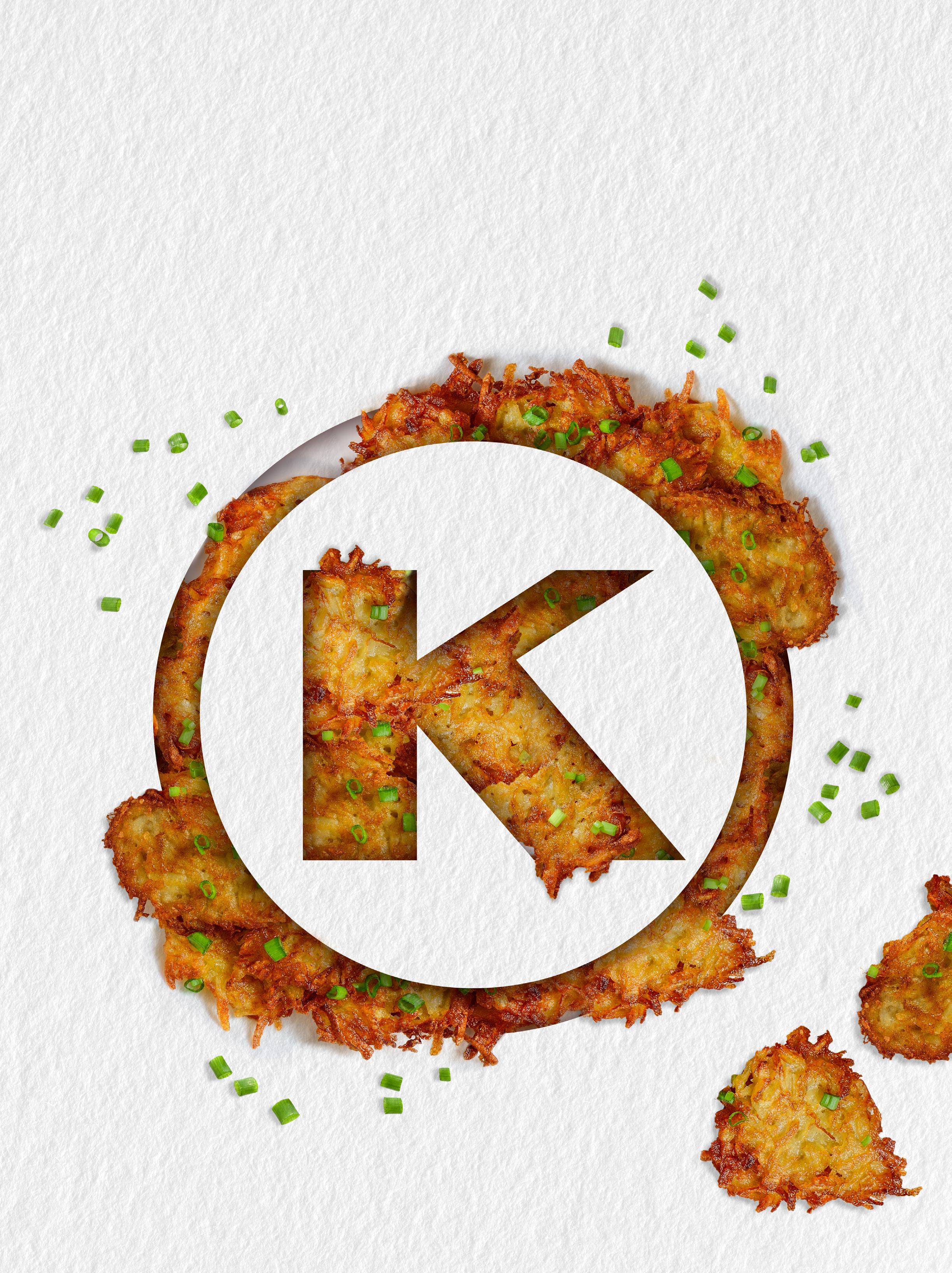
KISLEV 5781 WISHING YOU A HAPPY CHANUKAH ד”סב א”פשת ולסכ הכונח ןכעליירפ א CERTIFIED SOUL NUTRITION
by Rabbi Levi Y. Schapiro
One of the lessons that we learn from the little jug of oil on Chanukah is that after the olive is squeezed, the best and purest oil emerges. People are the same; somehow, when we are between a rock and a hard place, we find our inner strength and end up doing better than we did before.
In our ever-changing world, the kashrus community needed to quickly adapt to the new, health-focused rules and regulations – annual visits by Rabbinic Coordinators from our headquarters, regular unannounced visits, mashgiach temidi, and special kosher productions are all more complicated now than last year. Today, every country and every individual facility has its own set of safety requirements, and as a kosher certification agency with a global customer base, it certainly adds new challenges to the certification process.
At ~ Kosher, our commitment and diligence have not been affected by these challenges. On the contrary, we have strengthened our efforts and found new, creative ways for visiting and monitoring the factories we certify. Our rabbis are busy as ever; visits are being made, and in localities that are not allowing outside travelers to enter, local ~ rabbis are faithfully conducting extra inspections.
In this Chanukah issue, we bring you an article that Rabbi Levy OB”M wrote about kosher butter, as well as an article about kosher cheese production, based on a series of classes given in memory of Rabbi Levy OB”M by Rabbi Hershel Krinsky, a Senior Rabbinic Coordinator at ~ Kosher.
Now, more than ever, it’s comforting to know that some things never change. We are committed to doing the job at hand and ensuring that the kosher consumer can rely on us for products that are kosher without compromise.
I wish you and your family a Chanukah filled with light, health, and happiness.
Rabbi Chaim Fogelman Editor in Chief
 ~ Kosher Vaad HaKashrus
~ Kosher Vaad HaKashrus
Dear Reader,
3 SHARE YOUR SPIRIT 4 FROM THE DESK OF RABBI SHLOMO WEINFELD 6 YOUR KOSHER KITCHEN: FRYERS
photo credit: Marko Dashev
7 HEALTHY SPIRIT: CITRUS 8 RABBI ON THE ROAD
Ouriel Allouche 10 REMEMBERING RABBI DON YOEL LEVY OB”M
Butter Kosher? 12 CHANUKAH RECIPE: SUFGANIYA BABKA
Naomi
14 GEVINAS YISROEL
17 ~ AROUND THE WORLD: SPOTLIGHT ON INDIA
20 A CLOSER LOOK: CANNED VEGETABLES
Hendel 22 CHASSIDIC INSIGHTS: WHAT IS CHANUKAH?
23 SOUL NUTRITION
Chaim Fogelman KOSHER SPIRIT Chanukah 5781 EDITOR-IN-CHIEF: Rabbi Chaim Fogelman EDITOR: Dina Fraenkel DESIGN: Spotlight Design We welcome your comments, submissions and letters to the editor. Mail: 391 Troy Avenue, Brooklyn, NY 11213 Email: editor@kosherspirit.com © 2020. No portion of this publication may be reprinted without written consent from the publisher.
with Rabbi
Is
by
Elberg
By Rabbi Hershel Krinsky
by Dina Fraenkel
by Rabbi Sholom Ber
by Rabbi Moshe Bogomilsky
Rabbi
Iwrite about Rabbi Don Yoel Levy, a”h, from a privileged perspective. My great-grandfather and namesake, Abraham Goldstein, a”h, created the Orthodox Union’s kashrus division in 1923. He subsequently founded the Organized Kashruth Laboratories (~ Labs), now ~ Kosher, in the mid-1930s.
In 1968, my grandfather, George, a”h, sold the ~ to Rabbi Berel Levy, a”h, Don Yoel’s father. Our family knew Rav Berel, who davened in Simpson’s, the Lubavitcher shul a block from our home in Borough Park, Brooklyn. I had numerous opportunities to discuss kashrus with Rav Berel, usually on Shabbos. A warm individual, he was always generous with his time.
Share your Spirit
In 1988, shortly after Rav Berel’s passing, I was asked, in an outsourcing capacity, to run the Jewish Homemaker, the precursor to the Kosher Spirit (the JH ceased publication in 2002). Interacting with Rav Don Yoel, I saw a gentle man; I don’t think I ever heard him raise his voice. But he was also unbending when it came to kashrus. I was once privy to a remarkable interaction. A veteran ~ mashgiach erred grievously in supervising a certain facility. I could sense Rav Don Yoel’s broken heart as he was forced to let go his longtime friend.
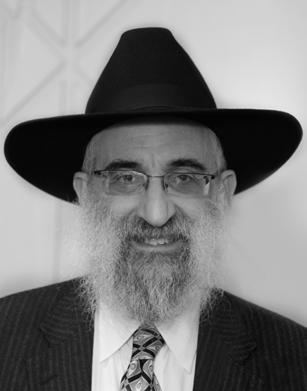
In 1998, after a year away, I was asked to work directly for the ~, running the Jewish Homemaker and the ~’s nascent website from the Crown Heights office. I was fortunate to participate in the ~’s weekly staff meeting (always begun with a dvar Torah), and I witnessed a man who knew so much about kashrus, yet humbly delegated authority to his rabbinic coordinators. The term “team effort” is so apropos for the ~.
Two vignettes are in order. One summer Friday, an employee’s car broke down on her way to the Catskill Mountains. Rav Don Yoel arranged for a car service to pick her up, footing the considerable fare to transport her to her destination before Shabbos. I was not surprised, because Rav Don Yoel’s largesse was part of his fabric.
Another story. The ~’s original name was Organized Kashruth Laboratories, reflecting the fact that Abraham Goldstein was a chemist (he would analyze products to determine their ingredients, often catching companies in a lie!). One day, Rikal Fogelman, Rav Don Yoel’s daughter, told me that the company wished to update its name to ~ Kosher, but the family first wanted to make sure that I, as Abraham’s descendant, did not object. I was so touched by this sensitivity.
I cried at the news of his passing. I cried for his wonderful wife, Malka. I cried for their children, treasured friends of mine. I cried for Klal Yisrael, which has lost a fierce advocate for kosher standards. And I cried for myself, having lost a friend and mentor.
Three years ago, Rav Don Yoel paid a shivah call after my mother’s passing. Perhaps I recently repaid this chessed. Shuls were closed at the height of the Covid-19 crisis, but I was part of a safe, ongoing, outdoor minyan in Far Rockaway. During shivah, I told one of his sons that I would say Kaddish for Don Yoel ben Dovber. I continued to do so until his son was able to attend a minyan.
I was especially touched that during Rav Don Yoel’s hospitalization, leaders at other kashrus agencies studied Torah in his merit. What a profound effort for a profound man. I am gratified that the Levy family has been a part of my life. Abraham and George Goldstein would be immensely proud.
Yehi zichro baruch; may his memory be a blessing.
Avi Goldstein was the editor of the Jewish Homemaker for fourteen years. He currently works in the automobile industry, but he admits, eighteen years later, that he still has recurring dreams about the ~!
www.KosherSpirit.com 3 FEEDBACK
From the Desk
RABBI SHLOMO WEINFELD
Administrator, ~ Kosher Vaad HaKashrus

The Jewish holiday of Chanukah focuses on the miracle of the Maccabees’ defeat of the Ancient Greek army. Of course, a main highlight of this victory was the discovery of the one, pure vessel of olive oil – seemingly enough for only one day — that kindled the menorah in the Beis HaMikdash for eight days. Our tradition teaches us to live our history as a true experience, and that it is applicable to our modern-day lives, not just as a commemoration of a historical event. In that spirit, let’s have a look at olive oil from the perspective of kashrus, as well as its spiritual significance.
Olives are a distinctive fruit, as one of the shivas haminim, and their oil has a unique status and importance in both Judaism and in the culinary world. The taste and color of different types of olives can vary depending on where they were grown and how they were treated, and are a topic of mastery with aficionados. Olive oil has become a valuable commodity the world over, known for its versatility. Extra virgin olive oil, in particular, is valued for its fine flavor and health benefits. Olive trees only produce a full harvest every other year, which led the industry to develop multiple pressings to extract all oil from the olives. The various extraction methods account for the range of quality levels including extra virgin, or “cold press,” pure, and light olive oils.
Extra virgin olive oil, the most sought-after and finest in quality, is generally of low kashrus risk given that the process of making it is traditionally limited to simply squeezing the oil from the olives. However, there are a number of potential concerns to screen for regarding non-extra virgin olive oil, especially important in today’s age of mass production.


For instance, due to the high demand of olive oil in general, some manufacturers may use additives in its production. This is

of
4 www.OK.org
among many other possible kashrus considerations, all of which necessitate a reliable kosher certification on non-extra virgin olive oil. (To read more details about the process of making olive oil, please see the Winter 2016 Issue Kosher Spirit.)
Even for extra virgin olive oil, though, there is still the consideration of other halachos related to crops grown in Eretz Hakodesh (the land within the Biblical definition of Eretz Yisroel’s borders). These kashrus concerns consist of terumos and ma’aseros, which are the separation of the priestly tithes, as well as the consideration of orlah1; fruit that grew on a tree during its first three years of life. For any fruit grown in Eretz Hakodesh, regardless of Jewish or non-Jewish ownership, the ~ utilizes the services of agronomists; experts who study plants used in agriculture, to verify that there are no orlah concerns. These professionals in crop science check the history of the trees from which the crops were taken in order to verify that the fruit is not orlah. Additionally, we have our kosher force of mashgichim ensure that terumos and ma’aseros were taken from the produce at hand.
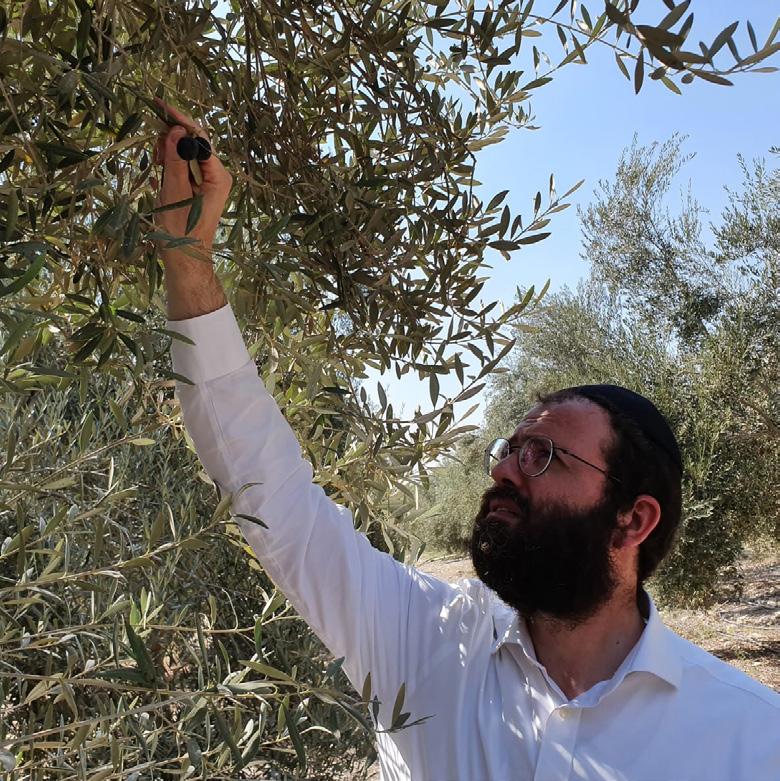
Though it may be popular these days to take a less stringent approach with uncomplicated products such as extra virgin olive oil, nevertheless, ~ Kosher upholds the value of certifying olive oil of all types according to these exacting standards.
In the spirit of not compromising on purity, we can dive deeper into Jewish texts to support this notion. In the Mishna, olive oil is described by our sages as the most choshuv, or deluxe, variety of oil. This mirrors the Chumash in which Hashem instructs Moshe Rabbeinu to use only pure olive oil for lighting the menorah in the Beis Hamikdash. The Torah goes into further detail, specifying that oil for this purpose should only be from the “first pressing,” which has been considered the finest quality oil since those times.
The Gemara tells us that olive oil symbolizes chochma (wisdom). Maseches Menachos mentions the people of a town called Tekoa, who were highly intelligent, attributing it to their diets, which were rich in olive oil. Regarding the story of Chanukah, Chassidus explains that the Ancient Greeks’ underlying, subconscious goal was to eradicate the spiritual manifestation of chochma from Yiddishkeit. They did not oppose the Jewish people’s culture or traditions as it were; rather it was the belief in and allegiance to Hashem

that offended their worldview. This is why, in battle, they did not remove the oil from the Beis HaMikdash. Instead, they took away its ritually pure status by breaking the seal, thus rendering it tamei. This explains why it was so important for the Chashmonaim to find pure, kosher olive oil with which to kindle the menorah. Halacha would have allowed the use of impure oil if there were no pure oil available. However, this particular fight revolved around emunah in Hashem. It was therefore all the more important to have used only pure oil, bearing the seal of the Kohen Gadol, for the menorah in the Beis Hamikdash, to affirm and underscore this intention.
As we always approach matters of ruchniyus, the lessons we learn from our history should be taken into our own lives in a practical way. Just as we all strive for spiritual growth as individuals, the ~’s approach to kashrus as an organization aims for the highest standard of supervision. We do this even when the product at hand is permissible according to some, in the spirit of not compromising on the spiritual level of purity.
The world of kashrus as a whole, and the ~ in particular, is still within the year of aveilus for Rabbi Levy, ob”m. Chochmas HaTorah and kedushah were indeed very dear to him in every aspect of both his personal and professional life. From the early hours of the morning until late at night, Rabbi Levy was busy learning Torah and helping others to spread kedushah in the world. When challenged, he made sure to protect the principles of kashrus, without compromise, similarly to how the Chashmonaim guarded the spiritual purity of the ritual of lighting the menorah. May we be zoche to continued siyata di’shmaya to follow in his ways, and have brochos in all that we do until we merit to see Moshiach Tzidkeinu and experience techiyas hameisim and reunification with all those we have lost. ~
5 www.OK.org
1. For more information about orlah see Kosher Spirit Tishrei 5781.
www.KosherSpirit.com 5
Kosher Kitchen your Fryers
By Rabbi Levi Y. Schapiro, ~ Rabbinic Coordinator

Many Jews have the custom to eat fried foods on Chanukah to commemorate the miracle of the pure oil found in the Beis HaMikdash. There are many different ways to fry food, but this article will focus on the traditional deep fryer and the new fad on the market, the air fryer. (For information on frying pans see the Tishrei 5781 edition of Kosher Spirit.)
As with all kitchen appliances, separate appliances are needed for meat and dairy; however, what if...
Q: I usually use my fryer for dairy (ex. mozzarella sticks). Can I make French fries with fresh oil and serve them with meat?
A: One may not deliberately fry the fries in a dairy fryer with the intention to eat them with meat.1 However, there may be applicable leniencies if the fryer is clean and was not used for cheese in the past 24 hours, or if the fries were already mixed with the meat.2 A Rav would need to be consulted with the exact details.
Q: What about using a dairy air fryer to cook fries that will be served with meat?
Similar to a traditional fryer one may not deliberately fry the fries with the intention to eat it with meat. However,
contrary to the name of the item, an air fryer does not fry the food. It is a small convection oven that bakes the food with a small amount of oil sprayed on. It, therefore, has all halachos of an oven and may not be subject to some of the above leniencies.3
Q: Can I use the same fryer for fish and meat?
A: Although one may not mix meat and fish, most opinions allow for shared equipment; however, one must be careful that the fryer is completely clean and fresh oil is used.4
Q: My fryer has removable parts, can I buy two sets of removable parts and use one for meat and one for dairy?
A: No, the oil used in the fryer connects all of the surfaces as one, so it is not sufficient to have two sets of parts.
Q: Can I kasher my fryer for Pesach? From meat to dairy? Or to pareve?
A: Generally speaking, we are not permitted to kasher from meat to dairy or vice versa;5 however, if a mistake occurred and a utensil was incorrectly used and became non-kosher, or if one wants to kasher for Pesach or to pareve, one may do so.
Because a deep fryer is used with a substantial amount of liquid (oil), technically it may be kashered by hagalah; however, there is a critical point that must be made when attempting to kasher a deep fryer –it must be completely clean. This is quite difficult to accomplish. If one is certain
that all residue has been removed, the fryer may be kashered.
To kasher a deep fryer, disassemble all removable parts, fill the fryer with water, allow the water to boil and dip in all removable parts (including the lid) and rinse with cold water. Afterward, let the water boil over the sides6, drain the water, and rinse the fryer with cold water.
Q: How do I kasher an air fryer?
A: As noted above an air fryer has the same halachos as an oven and hagalah would not be sufficient; kashering by libun is required. This can be done by removing the basket from the plastic container and using a blow torch to heat it. This may cause damage to the appliance, so please consult the manual. If one might damage the appliance, one is not permitted to kasher it.
When kashering from meat or dairy to pareve, hagalah or libun kal is sufficient.7 One can run the oven for an extended period at a temperature above 450oF
Q: Does a fryer require Tevilas Keilim?
A: Yes. If one is concerned that the appliance will break if submerged, a halachic authority should be consulted about how to proceed. For an air fryer, only the removable basket requires tevila, which would not pose any risk to the appliance.
*Please note, all of the above applies to appliances intended for home use. Commercial equipment may operate differently and has its own set of guidelines.
6 www.OK.org
A:
1. ולשבתנש רחאל אקודד )ב”עס ה”צ ’יס( א”מרה ןושלמ עמשמ ןכ םיקסופה ובתכ ןכו ,הליחתכל אל לבא רתומ ומוי ןב וניאב 2. כ”ונבו ותליחתב ה”צ ’יס ע”וש האר
3. ד”קס ה”צ ’יס ך”ש האר 4. םיקסופה תמכסה ןכו ,ג ק”ס ה”צ ד”וי ז”ט 5. א”יקס ט”קת ןמיס ח”וא א”גמ
~
7. ט”קתו א”נת ’יס ח”וא י”בב אבוה ,א”בשר ה”גהב ג”יעס א”נת ’יס ברה ע”ושבו
6. Please consult the manual to make sure this will not damage your machine or cause a safety hazard.
CITRUS FRUITS

The winter isn’t generally known as the season for fresh fruits and vegetables, but citrus fruits are at their peak during the winter season.
A single orange or grapefruit contains more than 100% of the recommended daily value of Vitamin C – perfect for staving off the common cold and other viruses
The antioxidants found in citrus fruits can inhibit cancer growth and repair cell damage, so a diet rich in citrus fruits may help prevent certain cancers.
Consuming citrus fruits alongside iron-rich foods aids in iron absorption.
Oranges are high in soluble fiber, which helps lower LDL cholesterol levels.
Eating citrus fruits can increase the level of citrates in urine, which can prevent a certain type of kidney stones from forming.
A diet rich in grapefruit is linked to lower blood pressure.
Citrus fruits have a high concentration of flavonoids, which are believed to protect brain cells and help prevent neurodegenerative diseases.
Citrus fruits have a low glycemic index, which means that the sugars are released into the bloodstream slowly and don’t cause a spike in blood sugar levels.
www.KosherSpirit.com 7
Jaffa oranges (like any fruit or vegetable grown in Israel) require kosher certification to ensure that they are not orlah and that Terumos & Ma’asros were taken from the harvest.
& Egypt United Arab Emirates
with Rabbi Ouriel Allouche
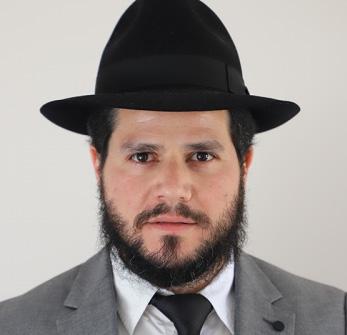
A few times a year I travel to Egypt to visit the ~ certified facilities spread across the country. There is even a direct flight from Tel Aviv to Cairo, which has been operated by Air Sinai since the Israeli-Egyptian peace agreement (signed in 1979). It’s a short flight – only about an hour! My most recent trip took place in February 2020.
On this trip, I was picked up at the airport and driven to Suez, a city located on the north coast of the Gulf of Suez, on the western shore of the Sinai Peninsula. The facility produces industrial chemicals and kosher certification is essential for their business. The Egyptian staff members were very kind and made sure I felt safe during the whole trip.
After the visit, I traveled north to Damietta, a city near the Mediterranean Sea, where I stayed in a hotel overnight to visit a canning facility in the morning. Unfortunately, in this area, there is no kosher food or Jewish communities, so I had to rely on food that I brought from Israel.
After visiting the canning facility, I made the three-hour drive back to Cairo to visit the well-

OURIEL ALLOUCHE Chabad of Dubai 8 www.OK.org EGYPT SAUDIAARABIA IRAQ IRAN TURKEY JORDAN YEMEN OMAN UAE SYRIA ISRAEL LEBENON
RABBI
known Hero jam facility. Hero exports its products across Europe and the US and can be found in many kosher supermarkets.
After I visited Hero, I had a few hours before my flight to the United Arab Emirates so I took the opportunity to visit one of the few synagogues left in Cairo. The synagogue, called Sha’ar Hashamayim, is preserved by the Egyptian government. The visit was emotional as I thought about the history of the Jewish people and communities in Egypt, most of which were abandoned in the late 1960s. The few Jews left in Egypt attend the synagogue on Yomim Tovim.
When I landed in Dubai, the capital of the United Arab Emirates, I was off to attend Gulfood – one of the biggest food exhibitions in the world.
Fortunately, I met an Israeli ex-pat in my hotel who introduced me to Rabbi Levi Duchman and his Chabad Jewish Center in Dubai, and I was able to enjoy daily minyanim and kosher food. (Before the recent historic peace agreement between Israel and the UAE, the Chabad center did not publicize their activities.)


Gulfood hosts thousands of companies, coming from hundreds of countries, and it takes days to go around and meet them all. I was able to meet many representatives and introduce them to the kosher world. It’s interesting to see how companies understand the importance of kosher certification and many of them approached me and stopped everything they were doing to discuss how their company could become kosher certified.
Dubai is quite an interesting place, a mixture of East and West, new and old. You can feel and see the investment that the Emirates have made here to make Dubai a capital of the Middle East and gateway to the world.

After an intense week on the road, I flew back to Israel (via Jordan, as direct flights were not yet available in February), and returned to my family who was definitely happy to have me home. ~
5 days travelling
4 flights
900 kilometers driven
5 cities visited
4
facilities + an exhibition visited by the numbers
Rabbi Allouche and Rabbi Lando meet with Rabbi Levi Duchman of Dubai Kosher
The Nile
www.KosherSpirit.com 9
Chabad of Dubai
Building on our longstanding presence in the Persian Gulf, ~ Kosher has recently launched a new division, ~ Kosher Middle East, focusing on the United Arab Emirates (UAE). Rabbi Ouriel Allouche has been tasked with directing this new initiative.
The ~’s presence in the United Arab Emirates began as early as 2011 in Dubai. We are proud to add the United Arab Emirates to our global network of kosher outposts, to assist companies in manufacturing kosher products that meet the standards of the most discerning kosher consumers worldwide. We look forward to leading this new frontier in kosher production.
Is Butter Kosher?
By Rabbi Don Yoel Levy OB"M
ABOUT BUTTER AND KOSHER
For a long time, kashrus agencies considered butter a Group One ingredient—a category applying to products that are kosher without supervision. However, ongoing developments in food production have introduced many kashrus concerns, invalidating common assumptions.


Kosher agencies and consumers commonly believed that butter presented no kashrus concerns because butter can only be made from the milk of a kosher animal (the milk of a non-kosher animal will not congeal). But, food production methods have developed greatly and the above logic is no longer reliable.

WHAT IS BUTTER?
Butter is mostly butterfat with the addition of milk elements and water. It was traditionally
made from sweet cream (commonly called heavy cream), the thick layer skimmed off the top of milk. Sweet cream contains both butterfat and buttermilk. A churning action causes butterfat lumps to bond together into balls of butter, while the buttermilk separates.
If the butter was still made with only this cream and perhaps some salt and water, we could continue to classify butter in Group One; however, it is not.
HOW IS COMMERCIAL BUTTER MADE?
The primary kashrus issue concerning butter is that whey cream is often added to it. Whey cream is a byproduct of cheese manufacturing. When milk is curdled to make cheese, it separates into two parts: the mass that will become the cheese and a watery compound called whey, part of which is cream.
Commercial companies seek to monetize every aspect of their production; nothing is discarded if it can be used in some way. When it was
The following is adapted
an in-depth essay
10 www.OK.org
from
by Rabbi Don Yoel Levy and was originally published in January 2014.
It can be, but must bear a reliable kosher symbol.
discovered that whey cream can be made into butter, cheese companies began selling their whey cream to butter companies.
Why would a butter company add whey cream to its products? The answer again is economics; whey cream is less expensive than sweet cream. If a company can successfully make butter by using whey cream, the company stands to save money.
WHY IS CHEESE NOT INHERENTLY KOSHER?

Cheese needs kosher supervision for two reasons. First, all ingredients in cheese, including the rennet (the curdling mechanism) used to set the cheese, must come from a kosher source (either microbial, genetically engineered, or a properly slaughtered animal). The starter culture also must be kosher, as must any additives that enhance the flavor.
At the ~, if cheese is made from non-kosher ingredients, we treat the whey as not kosher as well. (It should be noted that the Halachic authority Rabbi Moshe Feinstein, zt”l, considered this whey kosher. However, because of complexities in using whey that is made in this fashion, the major kashrus agencies do not permit the use of whey from non-kosher cheese.)
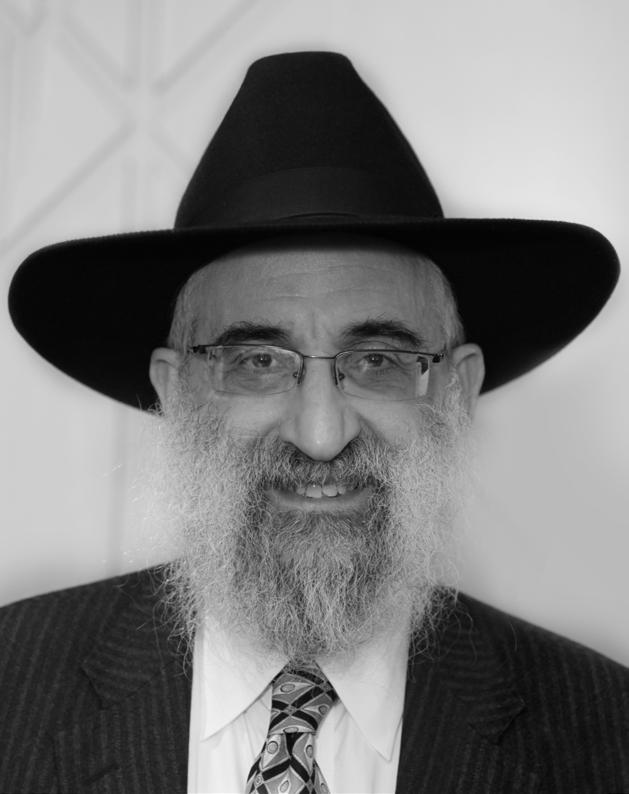
The second kashrus issue concerns Gevinas Akum, the kosher law that requires a Jewish person’s participation in the production of kosher cheese. Swiss cheese is the most common example of cooked cheese, produced by heating the curd and whey at or above
120°F. In this scenario, some hold the taste of Gevinas Akum has been absorbed into the whey. The prevailing view among kashrus agencies is to be strict with whey cooked over yad soledes bo as well. Therefore, if a Jew did not participate in cheese production, we will not certify the whey or whey cream byproduct.
One can argue that there is room for leniency with Swiss cheeses because the whey separates from the cheese before the cheese-making process is completed. At this earlier stage, one can make the case that the rule of Gevinas Akum is not invoked, but that is not the prevailing view.
But an additional serious concern arises with some Italian cheeses such as mozzarella, which are processed differently. After these cheeses are finished, they are cooked in water at 165°F to make them malleable. (This is how you get the “stretching” quality of cheese used for pizza.) During the cooking process, the taste of Gevinas Akum is absorbed into the water which also contains whey cream. Many mozzarella cheesemakers sell the whey cream that is extracted from this cooking water. Consequently, the presence of this whey cream in butter will render the butter not kosher.
Currently, the ~ does not certify any butter plants in which non-kosher whey cream is used in any fashion. Therefore, this comingling of cream is not an issue with ~-certified products, but it remains a general issue for the consumer in uncertified butter. ~
REMEMBERING RABBI DON YOEL LEVY OB"M ה”ע יוויל לאוי ןד ברה פ״שת׳ה ןסינ ב״כ ונורכז הכרבל
Administrator
Certification 1987-2020 www.KosherSpirit.com 11
Kashrus
of ~ Kosher
Sufganiya Babka SMALL BATCH
BY NAOMI ELBERG
MAKES 2-3 BABKAS
INGREDIENTS:
IN THE BOWL OF A STAND MIXER ADD:
1 ¼ c warm water
½ c. sugar


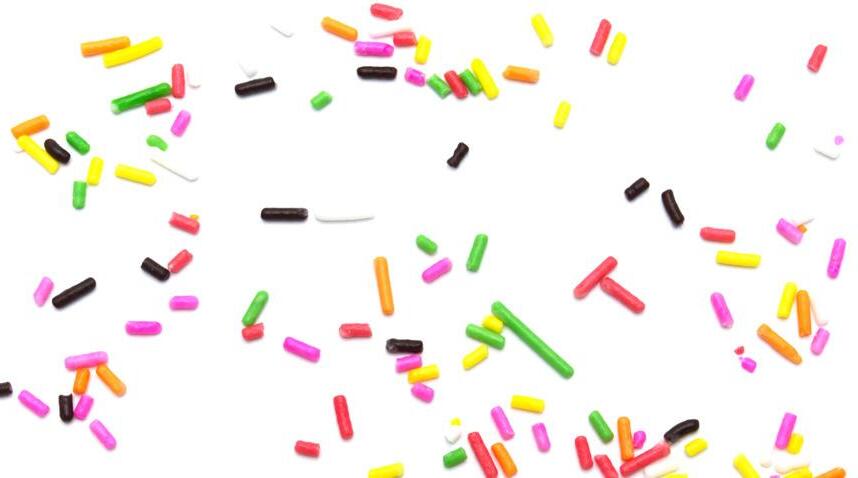

1 ½ tsp vanilla sugar


2 tsp cake batter flavor or butternut flavoring or vanilla extract



4 1/2 tsp dry yeast (2 packets)
Stir gently and wait for the yeast to bubble.
NEXT ADD:
2 eggs
12 tbsp unsalted margarine softened & cubed or ½ c canola oil
4-5+ cups bread flour/high gluten flour (start with 4 1/2 and add as needed)
½ tsp salt
Mix until the sides of the bowl become clean (add flour as needed). The dough will be slightly sticky. Cover and let rise for about an hour or until doubled in size.
Divide the dough into 3 portions. Let the dough rest briefly (10 mins) covered before rolling.
TO SHAPE BABKA:

1. Roll dough into a long and thin rectangle (the longer you roll the thinner and more layers you will have).
2. Spread wet filling over the dough, followed by a crunch/ texture layer, and then sprinkle with dry filling to keep it all contained.
3. Working from the long side of the dough, roll the dough into a long cylinder.
4. Fold the dough in half, twist several times, and place dough in a prepared loaf pan (optional: top babkas with crumb topping).
5. Cover both loaf pans with plastic wrap or a dish towel and set aside to rise again at room temperature for 30 minutes.
Place babka pans on a metal sheet plan and place in a preheated 350° oven for 45 minutes to 1 hour. Rotate the pan 180 degrees at the 30 minute mark.

After baking, dust the crumb topped babkas with sifted confectioners’ sugar or add a chocolate glaze to babkas without crumb topping and garnish with rainbow or chocolate sprinkles.
 FOLLOW NAOMI ON INSTAGRAM @NAOMI_TGIS
FOLLOW NAOMI ON INSTAGRAM @NAOMI_TGIS
12 www.OK.org
FILLINGS:
The key to delicious babka is layering your fillings. Start with a wet base (see below), followed by a crunch/texture layer (chocolate chips, sprinkles, etc.) and sprinkle with a dry filling.

STORE BOUGHT FILLING IDEAS:
LAYER 1 (WET)
• Custard
• Nutella
• Chocolate spread
• Halva
• Jelly (strawberry preserves)
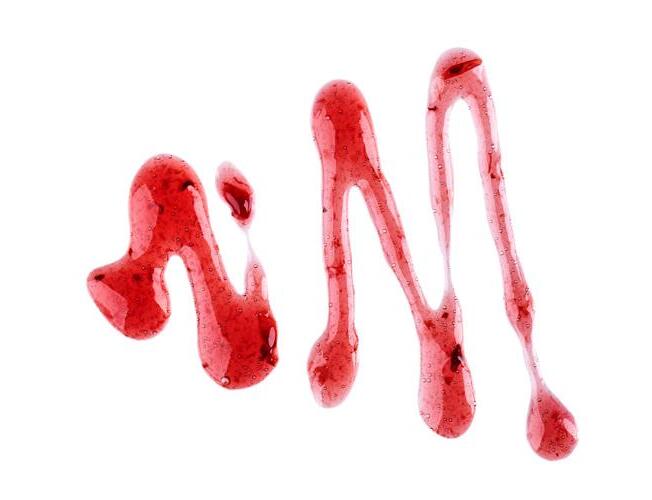
• Lemon
• Caramel
LAYER 2 (CRUNCH OR TEXTURE)

• Chocolate chips
• Sprinkles
• Caramel chips
LAYER 3 (DRY FILLING)
DRY CHOCOLATE

1 package of instant chocolate pudding powder
2 c confectioners’ sugar
1 c granulated sugar
DRY VANILLA Custard
1 package instant vanilla pudding mix
2 c confectioners’ sugar




1 c granulated sugar
OPTIONAL CRUMB TOPPING
1 c sugar
1 c flour
1 tbsp vanilla sugar
6-8 tbsp cold and cubed margarine
CHOCOLATE GLAZE


1/2 c unsalted margarine (8 tbsp) (stick form)
1/4 c warm milk
1 tbsp light corn syrup
2 tsp vanilla
4 oz semisweet chocolate chips
2 c sifted confectioners’ sugar
Combine milk, syrup, vanilla and butter until melted in a pot on low heat. Turn off flame. Add chocolate and stir. Add sifted confectioners’ sugar and stir until smooth. ~
www.KosherSpirit.com 13 RECIPE
The practice of making cheese is almost as old as the world itself. Cheese is produced by coagulating milk with rennet and then separating the curds (which becomes the cheese) from the liquid (whey). Early cheeses were sour, salty, and similar in texture to cottage cheese or feta cheese. The cheese produced in hot climates, like the Middle East, required a lot of salt to preserve it in the heat, and the cheese produced in cooler European lands required less salt, which allowed various microbes and bacteria to colonize the cheese and produce the unique flavors often found in aged cheese.
Most cheese varieties that we enjoy today, like cheddar, parmesan,
GEVINAS Yisroel
 BY RABBI HERSHEL KRINSKY, ~ SENIOR RABBINIC COORDINATOR
BY RABBI HERSHEL KRINSKY, ~ SENIOR RABBINIC COORDINATOR
Gouda, and Camembert, were created in the Middle Ages, between the 16th and 18th centuries. Europe is known for producing the most varieties of cheese, with Britain having 15 protected types of cheese, France 50 types, Italy 46, and Spain 26. France alone produces over 2,000 different cheese products.
Cheese was introduced to the Americas by European colonists. Mass production of cheese in America was introduced in 1850 by Jesse Williams, a dairy farmer from Rome, New York, who purchased milk from farms nearby and created an assembly-line process for cheese production. A decade later rennet was being massproduced as well and later on the invention of microbial rennet stan -
dardized the cheese-making process and further increased mass production, which in turn lowered the price of cheese and made it more available to the poorer classes. By World War II, factory-produced cheese far eclipsed traditional cheese-making in both America and Europe.
WHAT MAKES CHEESE KOSHER?
Kosher cheese requires kosher milk (either Cholov Yisroel or Cholov Stam), kosher rennet (from a shechted kosher animal or microbial), kosher equipment, AND the participation of a Shomer Shabbos Jew. Only with all of these conditions can the cheese be Gevinas Yisroel and kosher.
14 www.OK.org
GEVINAS
The Mechaber says1, “Cheeses made by non-Jews are forbidden because they are produced with non-kosher rennet. Even if the cheese is produced with vegetarian rennet it is forbidden.” Tosfos, in Avoda Zara, says that in Narbonne (a region in France) the rabbonim permitted cheese made by a non-Jew because they only used vegetarian rennet, but the Rambam did not agree with this.
The Rema states that the ruling of the Mechaber was the prevailing custom and it could not be changed unless one was in a place that permitted cheese made with vegetarian rennet from earlier times (i.e. Narbonne).2
The Rema continues, explaining, “If a Jew oversees the production of the cheese, it is permitted, after the fact.”3
While Ashkenazim generally pasken like the Rema, the Shach has a long commentary on the ruling of the Mechaber. The Shach holds that it is not enough for a Jew to watch the cheese production; he needs to participate (add the rennet). Most of the Acharonim don’t agree with the Shach. The ~ adheres to the Shach’s position for weekday productions.
MAKING CHEESE ON SHABBOS
A Jew cannot produce cheese on Shabbos, due to the prohibition of boneh (building), which happens when the coagulant is added to the milk. According to Shulchan Oruch HaRav4, if a Jew observes a non-Jew milk the cow and add the rennet [to make cheese] on Shabbos, the Jew is permitted to purchase the cheese after Shabbos and eat it. It is permissible because the Jew is not performing work and does not own the cheese until he purchases it after Shabbos. The Jew is merely the shomer to confirm that only kosher milk, kosher rennet, and
kosher equipment was used to make the cheese.
The Rema echoes this opinion in Hilchos Shabbos and it is also written in Oruch HaShulchan, Mishna Berurah, and Kitzur Shulchan Oruch. The Shach does not agree with this opinion though and requires active participation by the Jew. The Noda B’Yehudah, in his responsa, clearly states that the minhag is to hold by the Rema. When a kosher certified company makes cheese on Shabbos or Yom Tov, the mashgiach watches the non-Jew add the rennet (as opposed to during the week when he physically adds the rennet).
At the end of the responsa, the Noda B’Yehudah says that if a Jew owns the rennet that is used to coagulate the milk, then the non-Jew is merely using the rennet and the Jew has ownership in the cheese, making the cheese permissible l’chatchila. Kashrus agencies do not rely on rennet ownership completely, but they do rely on ownership PLUS watching the production for Shabbos and Yom Tov. The ~ policy is that we own the rennet when we certify cheese, and we even pay for it and make a kinyan.
WHAT ABOUT WHEY?
All of the halachos and opinions mentioned above only apply to the actual cheese. Whey, the liquid leftover from making cheese after the curds have been formed does not have a din of Gevinas Yisroel; it does not need Jewish ownership or Jewish participation to be kosher. Whey can be kosher even if the cheese is Gevinas Akum (which makes the cheese non-kosher)! There are many cheese production facilities in America where the cheese is considered not kosher, but the whey has kosher certification. For whey to be kosher, the ingredients need to be kosher and the production equipment needs to be kosher.
1. Shulchan Oruch, Yoreh Deah, Siman 115, Sif 2, Gevinas Akum.
2. Ibid.
3. Ibid.
4. Siman 307, sif katan 38.
www.KosherSpirit.com 15
Most American style cheeses do not require high heat during production, so the equipment does not become non-kosher. We run into a problem with some European cheeses, like Swiss, that are heated to about 120℉ or higher, which is above yad soledes bo (too hot to touch). Do we consider the whey to have been cooked with Gevinas Akum? There is a long responsa from Rav Moshe Feinstein ztz”l where he states that the prohibition against Gevinas Akum does not apply until one has the finished cheese. As long as it is still a soupy mixture of curds and whey, it is not cheese and the prohibition of Gevinas Akum does not apply. It is only cheese once the curds are separated from the
whey. Even if the batch went over yad soledes bo the whey can still be kosher. Nevertheless, the ~, as well as some other certifying agencies, will not certify whey that was cooked over yad soledes bo.
KEILIM AND NON-KOSHER WHEY
Even agencies that do not certify whey that is cooked above yad soledes bo agree that it is a stringency and does not render the equipment nonkosher. The same rationale would apply to a drying company that dries whey into powder. The company likely receives whey from many different cheese plants, including some that cook the cheese above yad soledes bo. As long as the drying company segregates the hot-cooked whey, the equipment would not need kashering before a kosher production. It would only need to be thoroughly cleaned.
There is a separate issue that affects whey, which is the production of cheeses like mozzarella, provolone, and other Italian cheeses. These cheeses are cooked, after they are made, at high temperatures to make
them stretchy and soft. If those cheeses are Gevinas Akum, then the cook water in the kettle becomes non-kosher according to all opinions and the equipment might be non-kosher as well. One might wonder why the kosher status of the water is important. Why isn’t it just thrown away? The cook water contains important byproducts, including whey cream (which is sometimes recycled and used within the plant itself or sold for butter and ice cream), lactose, and other byproducts. These byproducts are very lucrative for the plant. This needs to be carefully considered by the certifying agency and some plants even have a mashgiach temidi to ensure that the cheese (especially those cooked at a high temperature) is kosher so kosher whey cream can be reincorporated into their products.
SIMANIM AND LABELING
Since cheese needs a mashgiach temidi, whether he is only watching, or he is participating in the production, it is significantly more expensive to produce kosher cheese versus nonkosher cheese. As such, kosher cheese requires special simanim on the labels, similar to meat or fish, because there is a risk that a producer would replace the expensive kosher cheese with cheaper non-kosher cheese.
Without proper simanim, using Hebrew letters, holograms, or other sophisticated labeling methods, the cheese could be problematic. All kosher cheese, whether Cholov Yisroel or Cholov Stam needs these special simanim and the labels need to be in the sole control of the mashgiach temidi (i.e. in a locked cabinet where they cannot be accessed by a non-Jew). ~
16 www.OK.org
Aroundthe World
SPOTLIGHT ON
BY DINA FRAENKEL
~ Kosher is proud to be an industry leader with a global reach and presence. One region with a particularly fast-growing interest in kosher certification is India, where the ~ has been certifying manufacturing companies for several decades.
Food is a big part of Indian culture and we make it our mission to bring an ever-growing selection of kosher foods to consumers with discerning kosher standards. To comply with our kosher standards, ~ Kosher certified companies in India very often need to put in extra ongoing effort on their part. Each time new ingredients need to be sourced, which can be quite often compared to other regions, or ingredients from a new supplier need to be added, our clients are required to obtain our written approval which, in some cases, requires in-depth research on our part. They are also tasked with being on top of the required digital submissions1 to obtain individual approval for each of their ongoing bulk shipments. This ultimately allows for a vast number
www.KosherSpirit.com 17
1. Like ISO tank requests, explained later in this article.
of kosher products across the world to be produced with kosher ingredients made in India. At first, Rabbinic Coordinators from ~ Kosher Headquarters in New York managed these certifications and conducted the initial and annual executive visits. Our local rabbinic field representatives in India served as the boots on the ground for unannounced inspection visits. Among these rabbis was Chabad of Mumbai’s Rabbi Gavriel Holtzberg, ד”יה, who took a lead role in this capacity until his tragic murder at the hands of terrorists in 2008. Rabbi Yisroel Kozlovsky,’ יחיש, who now heads Chabad of Mumbai, also conducts visits for ~ Kosher certified companies in India.
For the past ten years, the ~ affiliate division in India is headed by Rabbi Avraham Rapoport, who also serves as ~ Kosher’s Operations Manager at the regional affiliate office in Israel. Rabbi Rapoport has successfully established a solid team of expert mashgichim dedicated to the India region and shared some of his methods with us. “My process begins with assigning a mashgiach to each facility, who will become acquainted with the intricacies of the production, including how the machinery works. This mashgiach remains the long-term representative supervising the given facility. This is a standard unique to the top kosher certifiers and by no means a standard practice with every agency, especially in India.” It’s no small achievement given the proximity of qualified individuals for the job and the amount of travel and logistical complexity involved.
Nothing can be taken for granted in the food industry. Manufacturers are not always obligated by authorities to list every additive on their labels,
therefore the rabbi must not only be knowledgeable but diligent in his pursuit of information. Rabbi Rapoport personally visits India frequently himself, to inspect and review the work of his team. Rabbi Eli Lando, Executive Manager of ~ Kosher, made his first trip to India on behalf of the ~ right before Purim 5780, accompanying Rabbi Rapoport and senior mashgiach Rabbi Shlomo Sharon on their visits.
Rabbi Lando spoke with Kosher Spirit recently about his trip: “While I was in India, I joined a visit to Godrej Group and VVF, two of the largest oleochemicals conglomerates in India, based in Mumbai. I met with both of their management teams. It was inspiring and encouraging to see how proud both of these companies are of their relationship with Rabbi Rapoport, his team, as well as ~ Kosher at large.”
Oleochemicals refer to chemicals derived from natural oils and fats, which, when kosher, are derived from vegetable oils. Certifying these products in India presents some unique potential challenges. The procurement of kosher certified raw materials in India, for instance, is far more difficult than in other parts of the world. Most raw material suppliers of vegetable oils in India are not kosher certified.
18 www.OK.org
~ Kosher makes many visits by qualified, trained mashgichim regularly throughout the year to supplier sites across the country. This is to verify the kosher status of their products for our certified clients to be able to buy approved and supervised ingredients from them. Bulk liquid shipment, often referred to as ISO tank2 shipment, of vegetable oils is also quite common in this industry. This is a central piece of any kosher certification of oleochemicals, as the status of the tankers ultimately affects the kashrus of the end product.
We verify each shipment before it is loaded and shipped, and then re-verify it at the receiving port. Every oil shipment is traced, and every step of the supply chain is documented for traceability before approval.3 These are just a few examples of the amount of work that goes into certifying oleochemicals in India.
Mr. Vijay Kumar, one of our main kosher contacts at Godrej Group, warmly recalled a story from one of the first times Rabbi Rapo-
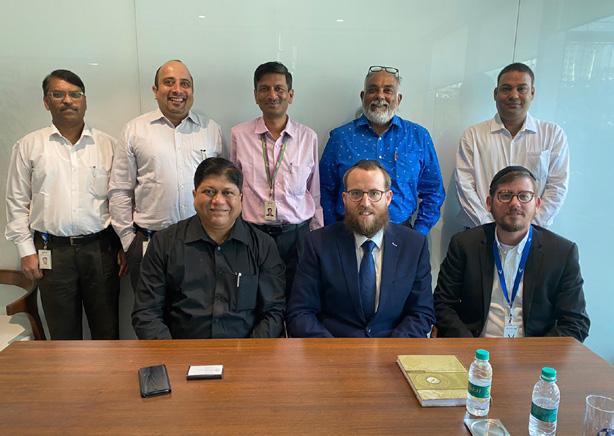
2. An ISO Tank is a tank container which is built to the ISO standard (International Organization for Standardization). ISO tanks are designed to carry liquids in bulk, both hazardous and non-hazardous. The tank is made of stainless steel and is surrounded by various types of protective layers.
3. For more information about kosher transport, see the Tishrei 5781 issue of Kosher Spirit
port visited. They were traveling together by train and, when he began to daven Shacharis on board, Mr. Kumar reminisced about ~ Senior Rabbinic Coordinator, Rabbi Leizer Teitelbaum ’יחיש, having done the same on his visits to India over 20 years prior. He vividly remembered the image of Rabbi Teitelbaum praying with his tallis and tefillin all those years ago. One can imagine the many unique and remote places in which rabbis in kashrus have brought kedushah in the world where a Jew may never have davened or even set foot before.
Although there aren’t many kosher consumers living in India, Godrej Group nevertheless makes a point of displaying the ~ Kosher symbol on locally distributed consumer goods (not just those for export). They are proud to show the world the kosher status of their products.

Rabbi Shlomo Sharon, our senior
tis.” In addition, having grown up with Indian-Jewish roots, he understands the local customs and mentality of the companies he visits. He can speak to them in their language and through the lens of their own culture. This plays a big role in his ability to educate them about kosher regulation at a high level.
Rabbi Lando’s meetings with clients in India showed that Rabbi Rapoport monitors ~ Kosher’s high standards with a personal touch. Rabbi Lando explained the importance of this, sharing, “When a company only fears their inspecting rabbi, there’s a risk that they’ll withhold information, as they’re not sure what should and shouldn’t be said. However, when the relationship involves both respect for our authority as well as camaraderie, then a bond is formed and kashrus is naturally improved as a result. This approach as you can see, makes a huge difference, as is evident in Rabbi Rapoport’s work.”
regional mashgiach for over a decade, shared how he became involved with ~ Kosher’s India division. “As a university student, I studied for a degree in chemistry. Only years later did I realize how helpful this background would be for my eventual work in kosher supervision! This was truly Hashgacha Pra-
As I wrapped up my conversation with Rabbi Lando, he had a final thought to share with our readers. “During the week Rabbi Rapoport and I spent in India together, Rabbi Don Yoel Levy, OB"M, was visiting Singapore, conducting kosher inspections there. Rabbi Levy derived much nachas ruach upon hearing the positive feedback about the ~’s Indian division. Even though India possesses its unique challenges to kosher certification, under Rabbi Levy OB"M’s, and now the Vaad HaKashrus’, leadership, ~ Kosher continues to further our internationally-renowned standards without any compromise based on local circumstances. It is important for the average consumer to understand the amount of time and effort that kosher agencies, plant personnel, and manufacturers dedicate to their jobs to maintain strict adherence to the laws of kashrus. The ~’s operations in India are a prime example of this level of dedication and commitment, and I’m glad to share a glimpse of it with you.” ~
www.KosherSpirit.com 19
Canned Vegetables

Rabbi Sholom Ber Hendel,
WHAT ARE CANNED VEGETABLES?
Canned vegetables are vegetables that are processed, sealed, cooked, and stored in cans. This is a low-cost method to extend the shelf life of the vegetable. It also provides consumers with a convenient and cheap way to enjoy vegetables, no matter the season.
HOW ARE CANNED VEGETABLES MADE?
The fresh vegetables are washed, peeled if necessary, and then cut to the desired size. Next, they are blanched with steam and placed in cans. In the meantime, a brine is prepared in a heated mix tank. Simple brines are usually made with just water and salt; sometimes preservatives are added as well. If the product is sweet, sugar or corn syrup is mixed with water and used as the brine. For other canned vegetables, a sauce is made using more complex ingredients.
The brine or sauce is poured into the cans with the prepared vegetables and sealed. The cans are then sent to be cooked in a retort. (A retort is a large pressure cooker filled with water.) This process kills the bacteria that cause food spoilage, allowing for the canned vegetable to be stored for long periods and remain fresh. At the end of the cooking process, the cans are cooled with cold water, dried, and labeled.
ARE CANNED VEGETABLES KOSHER?
There are a few kashrus concerns that can arise with canned vegetables:
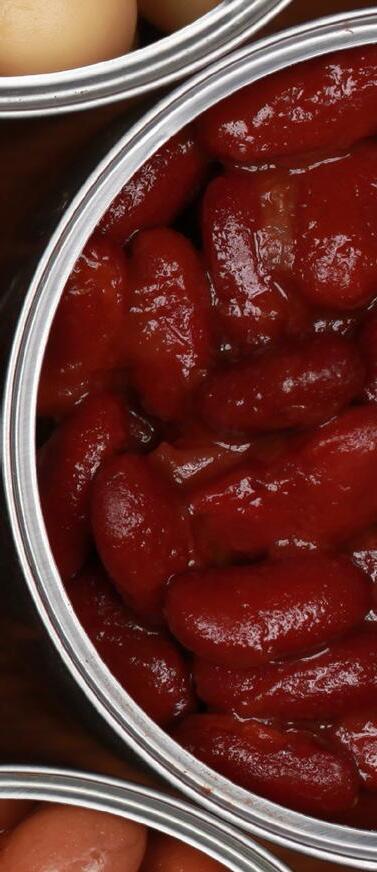
EQUIPMENT
Since vegetables are seasonal, manufacturers may end up with downtime between harvesting seasons. To prevent costly downtime, many manufacturers produce additional products that can be processed year-round, such as bean products and pasta sauces.
Many bean products are made with animal fats. Similarly, many pasta sauces are made

closer look
with non-kosher cheese or meat ingredients. In many manufacturing plants, the retort, as well as the heated mixing tank for the brine, are used for these non-kosher products. This will cause the equipment to become non-kosher and compromise the kosher status of the canned vegetable products if they are made with the same equipment.
Additionally, there are very large retorts that can process two products simultaneously and a plain vegetable product can be cooked at the same time as a pork and bean product. Even if they are processed in separate retorts, often the water used for heating or cooling the product is recycled between the lines.
ADDITIVES
All the additives need to be kosher certified. While there is no kosher concern with water and salt, as noted above, many canned vegetable products have more kosher sensitive additives.
TOLAIM INFESTATION
Some vegetables are prone to bug infestations. The canning process does not eliminate this issue. Vegetables prone to infestation require proper cleaning and inspection procedures before beginning the canning process.
BISHUL YISROEL

Vegetables require bishul Yisroel if they are not edible raw1 and if they are fit for a king’s table. Therefore, it is necessary to ensure that the cooking of these vegetables will be done with the involvement of the mashgiach.
~ Kosher recommends only purchasing canned vegetables with a reliable kosher certification.
1. Some vegetables, such as hearts of palm, are edible raw in the manufacturing countries, but they are not sold as raw vegetables in the US. This brings us to an interesting question - is bishul Yisroel necessary for hearts of palm? The accepted psak is that we go by the place where the vegetable is cooked; in that case hearts of palm do not require bishul Yisroel.
www.KosherSpirit.com 21
~ Kosher Vaad HaKashrus and Rabbinic Coordinator
a
By Rabbi Moshe Bogomilsky
“What is Chanukah?”
The Talmud1 emphasizes primarily the spiritual aspect of the Chanukah miracles. Our Sages ask: “What is Chanukah?” — I.e., for which miracle was the holiday instituted?2 Their answer recounts the episode of the Menorah without elaborating on the military victory over the Greeks. Although the miracle of the Menorah could not have taken place without the military victory, the victory itself does not define Chanukah. Chanukah is a holiday of spiritual light; even the war against the Greeks was essentially spiritual, since it was a struggle to preserve the Torah heritage from the taint of secular influence.3
This is why the prayer beginning VeAl HaNissim, which expresses thanks to Gd for the military victory, does not mention the spiritual miracle of the Menorah , for the latter eclipses it and is deserving of separate mention. 4 There is thus a separate means of commemoration for each of these two miracles.
Body and Soul
The name Chanukah shares the same root as the Hebrew word for “education”
— chinuch 5 This implies a connection between the commemoration of this holiday and our ongoing personal growth, for Chanukah, like all the festivals, communicates a message that applies even after its celebration has concluded.
of body and soul and although the soul needs the medium of the body in order to express itself, the supremacy of the soul is not limited; the soul invigorates the body, and controls its functioning.6
By emphasizing only the miracle of the lights, our Sages highlight yet a deeper lesson. Chanukah grants every soul the potential to express itself without any hindrance from the material nature of the body. One can live and function in the world without being influenced by worldliness.7 Chanukah enables us to live in the material world for the sake of a spiritual purpose, in the same way that the military victory over the Greeks was spiritually motivated. Chanukah further empowers us to make our lives within the world a medium for the expression of our spiritual service, like the miracle of the Menorah
Living in this manner will hasten the coming of the era when this ability will spread throughout the world — in the Era of the Redemption, when “the earth will be filled with the knowledge of Gd as the waters cover the ocean bed.”8 May this take place in the immediate future.
the iraclesMChanukah
On a basic level, the message of Chanukah — that spiritual light can overpower military might — teaches us the supremacy of soul over body. Although we are a composite
1. Shabbos 21b.
2. Rashi, loc. cit.
3. See the above essay entitled, “Why the Maccabees Rebelled: A Superrational Commitment to the Torah.”
4. According to this interpretation, the phrase (in VeAl HaNissim) “and they kindled lights in Your holy courtyards” does not refer to the lighting of the Menorah(for that was kindled in the Sanctuary building), but rather other lights kindled in celebration of the military victory. [The Derashos of the Chasam Sofer (p. 67a) offer a different interpretation.]
5. The following essay develops this idea at length.
The content in this page is produced by Chabad.org, and is copyrighted by the author and/ or Chabad.org. If you enjoyed this article, we encourage you to distribute it further, provided that you do not revise any part of it, and you include this note, credit the author, and link to www.chabad.org. If you wish to republish this article in a periodical, book, or website, please email permissions@chabad.org.
6. This concept has deeper significance pointing to — to borrow philosophic terms — the supremacy of form over matter. This principle lies at the heart of contemporary society, for in many areas, both in war and in peace, we have seen how superior thought, the medium with which we relate to form, can prevail over mere material power. This concept is paralleled in a halachic principle that eichus (“quality” or “inward virtue”) is given precedence over kamus (“quantity”).
7. Speaking of the halachic restrictions on transferring objects from one domain to another on Shabbos, our Sages (Shabbos 93b, as cited by Rambam in Hilchos Shabbos 18:28) state: “A person who transfers less than the standard measure [of a substance] is not liable even though he transfers it in a container. [Though he would have been liable had he transferred the container alone, here he is not liable, because] the container is subsidiary [to its contents]; [when the person transfers it,] he is concerned not with the container, but with what it contains.”
Similarly, concerning the connection between our bodies and our souls, we can regard our material activities as having no independent importance, and see them as nothing more than a medium for the expression of our divine service.
CHASSIDIC
22 www.OK.org
INSIGHTS
8. Yeshayahu 11:9.
By Rabbi Chaim Fogelman
הכונח comes from the word הנינח (compassion/pardon), for on Chanukah Hashem grants us blessings, sustenance, and goodness, beyond what we deserve. - THE MACHZOR VITRI
There is a hint to this in Rashi (Bereishis 8:11), which discusses the dove that Noach sent. The dove said to Hashem, “Let my food be as bitter as an olive in the hands of the Holy One, blessed be He, and not as sweet as honey in the hands of flesh and blood.”

REB MOSHE OF RAZVADOV ZTZ”L explains that the dove is the Jewish nation. They say, “Ribono Shel Olam, let my parnassah come from the blessings of Chanukah, when we use olive oil, because then the parnassah comes from Hashem’s compassion, and we get it even when we don’t deserve it. We prefer that, over the parnassah that comes from Rosh Hashanah, the time of year when we eat the apple with honey, because that parnassah is dependent on man’s deeds, and one receives parnassah according to what he deserves.
+n the days of Chanukah they miraculously kindled the Menorah for eight days.
The Menorah had on it seven lamps, so during the period of the miracle they kindled seven lights for eight days, a total of 56 candles, which in Hebrew numerals is ו"נ. Thus the name “Chanukah” connotes that —
ח — for eight days
ו"נ — 56 candles were miraculously kindled
ה"כ — this all started on the 25th of the month.
(רכששי ינב)
“What tzaddikim accomplish on Rosh Hashanah and Yom Kippur, a simple Yid can accomplish on Zos Chanukah.”
- THE RUZHINER ZTZ”L
SOUL NUTRITION
www.KosherSpirit.com 23

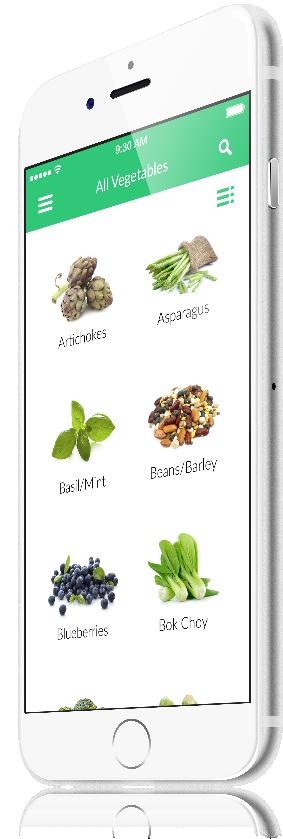


2 cutting-edge Kosher apps... redesigned and reimagined. KOSHER CERTIFICATION ~ Kosher Spirit, 391 Troy Avenue • Brooklyn, NY 11213 718-756-7500 • info@ok.org • www.ok.org follow us on Twitter @KosherAlerts For the latest in Kosher news: follow us on Facebook facebook.com/okkosher 2 cutting-edge Kosher Apps, now redesigned and available as a free download on Google Play or the App Store The Kosher Vegetable Checking Guide The Kosher Food and Restaurant Guide Wishing you a Happy Chanukah!

 ~ Kosher Vaad HaKashrus
~ Kosher Vaad HaKashrus




























 FOLLOW NAOMI ON INSTAGRAM @NAOMI_TGIS
FOLLOW NAOMI ON INSTAGRAM @NAOMI_TGIS










 BY RABBI HERSHEL KRINSKY, ~ SENIOR RABBINIC COORDINATOR
BY RABBI HERSHEL KRINSKY, ~ SENIOR RABBINIC COORDINATOR










